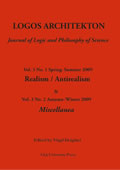On the effectiveness of Kalmár’s completeness proof for propositional calculus
On the effectiveness of Kalmár’s completeness proof for propositional calculus
Author(s): Adrian LuduşanSubject(s): Philosophy
Published by: Presa Universitara Clujeana
Keywords: completeness theorem; propositional calculus; completeness proof; Kalmár’s lemma; effective procedure; effective proof
Summary/Abstract: Ever since Kurt Gödel’s proof of the completeness theorem of first-order logic in 1930 other few alternative proofs have been produced, whose logical, mathematical or epistemological virtues are worth taking into consideration. In what follows we will deal with one of these alternative proofs for propositional calculus, namely that of Laszlo Kalmár. What strikes as remarkable in the case of this proof is, on the one hand, its constructive character, which offers an effective procedure of determining the proof of any tautology within the respective propositional calculus, and on the other hand, its simplicity. In his completeness proof, Kalmár uses a crucial lemma which glues syntactical derivation with semantic computation. The aim of this paper is to highlight two ways of understanding the effectiveness of Kalmár’s proof for this lemma, and to pinpoint a small problem regarding the effective character of the lemma alongside a solution to this problem.
Journal: Logos Architekton. Journal of Logic and Philosophy of Science
- Issue Year: 3/2009
- Issue No: 01
- Page Range: 221-245
- Page Count: 25
- Language: English

